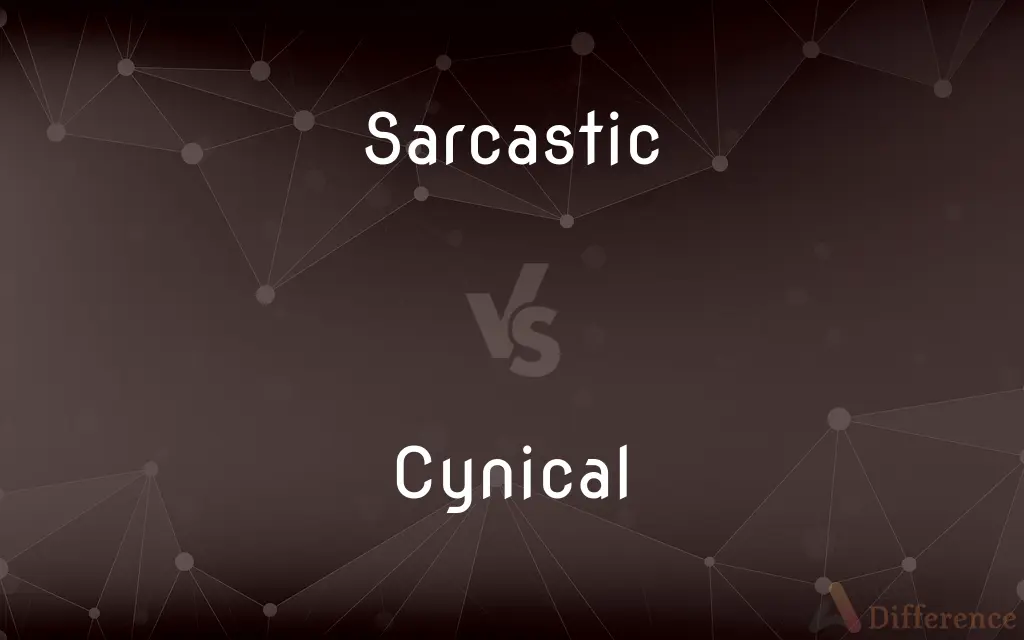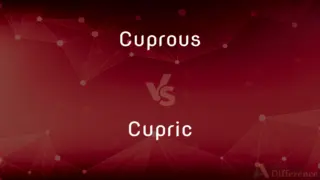Sarcastic vs. Cynical — What's the Difference?
Edited by Tayyaba Rehman — By Urooj Arif — Updated on March 8, 2024
Sarcastic remarks often convey the opposite of what is meant, humorously, while cynical views distrust or doubt sincerity or goodness.

Difference Between Sarcastic and Cynical
Table of Contents
ADVERTISEMENT
Key Differences
Sarcasm involves the use of irony or stating the opposite of what one truly means, often in a humorous or mocking manner, to convey disdain or criticism. Cynicism, on the other hand, reflects a general attitude of skepticism towards others' motives, intentions, or the inherent goodness in people, often without the use of humor.
Sarcastic comments are typically targeted and used in specific instances to make a point or criticize something or someone in a witty way. Cynical views, however, constitute a broader outlook on life, characterized by a pervasive distrust of human nature, institutions, and societal norms.
While sarcasm is often expressed verbally and is situation-specific, cynicism is an underlying perspective that can influence a person's overall demeanor and approach to various aspects of life, from interpersonal relationships to politics.
Sarcasm can be employed by individuals of various outlooks and does not necessarily indicate a cynical personality. People might use sarcasm as a form of humor or social commentary without harboring deep-seated skepticism or negativity. In contrast, a cynical individual tends to consistently doubt the sincerity, goodness, or effectiveness of actions, motives, and institutions.
The intent behind sarcasm is often to provoke thought, entertain, or express critique in a light-hearted or humorous manner, even if it might sometimes come off as harsh. Cynicism's intent is more about expressing a deep-seated disbelief in the possibility of sincerity, altruism, or effectiveness, often leading to more negative or dismissive attitudes.
ADVERTISEMENT
Comparison Chart
Nature
Use of irony or mock praise to convey criticism.
Skeptical attitude towards sincerity or goodness.
Expression
Often verbal and situational.
General outlook or perspective on life.
Target
Specific instances or comments.
Broad skepticism towards people, institutions, norms.
Associated Personality
Can be used by anyone, not indicative of overall outlook.
Indicates a distrustful, skeptical personality.
Intent
To entertain, provoke thought, or lightly criticize.
To express disbelief in sincerity or effectiveness.
Compare with Definitions
Sarcastic
Sarcastic remarks are often intended to be witty or humorous.
On a rainy, miserable day, What lovely weather we're having, isn't it?
Cynical
Believes people are motivated by self-interest.
Charities only exist because people want to feel good about themselves, not really to help.
Sarcastic
Expresses the opposite of what is meant, often humorously.
After a long, unproductive meeting, someone might say, Well, that was a fantastic use of our time.
Cynical
Tends to belittle optimistic or idealistic views.
In response to social change movements, Nothing's going to change; it's all just talk.
Sarcastic
Tied to particular situations or responses.
In response to a blatant mistake, Brilliant observation, nobody noticed that before.
Cynical
Questions the existence of genuine goodness or altruism.
No good deed goes unpunished; there's always an angle.
Sarcastic
Can lead to self-awareness or reevaluation.
When someone is overly confident about an easy task, Sure, it'll just solve itself.
Cynical
Doubts the effectiveness or sincerity of institutions.
Political promises are just a means to get votes, nothing more.
Sarcastic
Uses exaggerated or insincere praise to critique.
Referring to a poorly executed project, What a masterpiece, truly groundbreaking.
Cynical
Cynicism can permeate one's attitude towards various life aspects.
Relationships are just transactional, don't expect loyalty.
Sarcastic
Expressing or marked by sarcasm.
Cynical
Believing that people are motivated purely by self-interest; distrustful of human sincerity or integrity
He was brutally cynical and hardened to every sob story under the sun
Sarcastic
Given to using sarcasm
A sarcastic friend.
Cynical
Concerned only with one's own interests and typically disregarding accepted standards in order to achieve them
A cynical manipulation of public opinion
Sarcastic
Containing sarcasm.
A sarcastic quip
The teacher's sarcastic tone
Cynical
Believing or showing the belief that people are motivated chiefly by base or selfish concerns; skeptical of the motives of others
A cynical dismissal of the politician's promise to reform the campaign finance system.
Sarcastic
(of a person) Having the personality trait of expressing sarcasm.
Cynical
Selfishly or callously calculating
Showed a cynical disregard for the safety of his troops in his efforts to advance his reputation.
Sarcastic
Expressing, or expressed by, sarcasm; characterized by, or of the nature of, sarcasm; given to the use of sarcasm; bitterly satirical; scornfully severe; taunting.
What a fierce and sarcastic reprehension would this have drawn from the friendship of the world!
Cynical
Negative or pessimistic, as from world-weariness
A cynical view of the average voter's intelligence.
Sarcastic
Expressing or expressive of ridicule that wounds
Cynical
Expressing jaded or scornful skepticism or negativity
Cynical laughter.
Cynical
Of or relating to the belief that human actions are motivated only or primarily by base desires or selfishness.
Cynical
Skeptical of the integrity, sincerity, or motives of others.
Cynical
Bitterly or jadedly distrustful or contemptuous; mocking.
Cynical
Showing contempt for accepted moral standards by one's actions.
Cynical
Like the actions of a snarling dog, especially in reference to facial nerve paralysis.
Cynical
Believing the worst of human nature and motives; having a sneering disbelief in e.g. selflessness of others
Common Curiosities
Is cynicism always negative?
While generally considered negative due to its skeptical nature, some view cynicism as a form of realistic or critical thinking.
Is it possible to be too sarcastic or cynical?
Excessive sarcasm can alienate others or hinder communication, and deep cynicism can lead to negativity and hinder personal relationships.
Can a cynical person be sarcastic?
Yes, a cynical person can use sarcasm as a way to express their skepticism or distrust, but not all sarcastic people are cynical.
Can sarcasm be a sign of cynicism?
While sarcastic individuals aren't necessarily cynical, frequent sarcasm can sometimes reflect underlying cynical attitudes.
Can sarcasm or cynicism be constructive in any way?
Sarcasm can foster creativity and critical thinking when used constructively. Cynicism, while often seen as negative, can prompt individuals to question norms and think more critically about societal structures.
Why do some people prefer to use sarcasm in their communication?
Some people use sarcasm as a defense mechanism, to add humor to conversations, or to subtly convey criticism without direct confrontation.
In what types of professions might sarcasm and cynicism be more prevalent?
Professions with high levels of stress, competition, or those that deal with societal flaws, such as law, emergency services, and politics, might see higher instances of sarcasm and cynicism.
How do cultural differences affect perceptions of sarcasm and cynicism?
Cultural backgrounds significantly influence how sarcasm and cynicism are expressed and interpreted. What is considered humorous sarcasm in one culture might be seen as rude or misunderstood in another.
How do people usually respond to sarcasm and cynicism?
Responses can vary; sarcasm might be appreciated for its wit, while cynicism might be seen as negative or demoralizing.
How can one effectively communicate with a highly cynical person?
Clear, honest communication and providing evidence for assertions can help in dealing with cynical individuals, as it addresses their skepticism towards motives and truth.
Is it possible to change from being a cynical person to a more optimistic one?
Yes, with self-reflection, positive experiences, and sometimes professional guidance, individuals can shift towards a more optimistic outlook, reducing their cynicism.
How can one distinguish between sarcastic and cynical remarks?
Sarcasm is often momentary and tied to specific comments, usually with a humorous undertone, whereas cynicism reflects a pervasive, general skepticism without necessarily aiming for humor.
Can sarcasm be harmful in communication?
Yes, sarcasm can sometimes be misinterpreted as genuine praise or missed entirely, leading to misunderstandings and potentially harming relationships.
Are there any benefits to having a cynical outlook on life?
While often viewed negatively, a moderate level of cynicism can serve as a protective mechanism, helping individuals navigate and assess risks in potentially exploitative situations.
How do sarcasm and cynicism influence online interactions?
Online, sarcasm can be harder to detect without vocal tones or facial expressions, leading to misunderstandings. Cynicism can spread more easily, influencing public opinion and social discourse, often contributing to a more negative online environment.
Share Your Discovery

Previous Comparison
Patisserie vs. Bakery
Next Comparison
Cuprous vs. CupricAuthor Spotlight
Written by
Urooj ArifUrooj is a skilled content writer at Ask Difference, known for her exceptional ability to simplify complex topics into engaging and informative content. With a passion for research and a flair for clear, concise writing, she consistently delivers articles that resonate with our diverse audience.
Edited by
Tayyaba RehmanTayyaba Rehman is a distinguished writer, currently serving as a primary contributor to askdifference.com. As a researcher in semantics and etymology, Tayyaba's passion for the complexity of languages and their distinctions has found a perfect home on the platform. Tayyaba delves into the intricacies of language, distinguishing between commonly confused words and phrases, thereby providing clarity for readers worldwide.















































